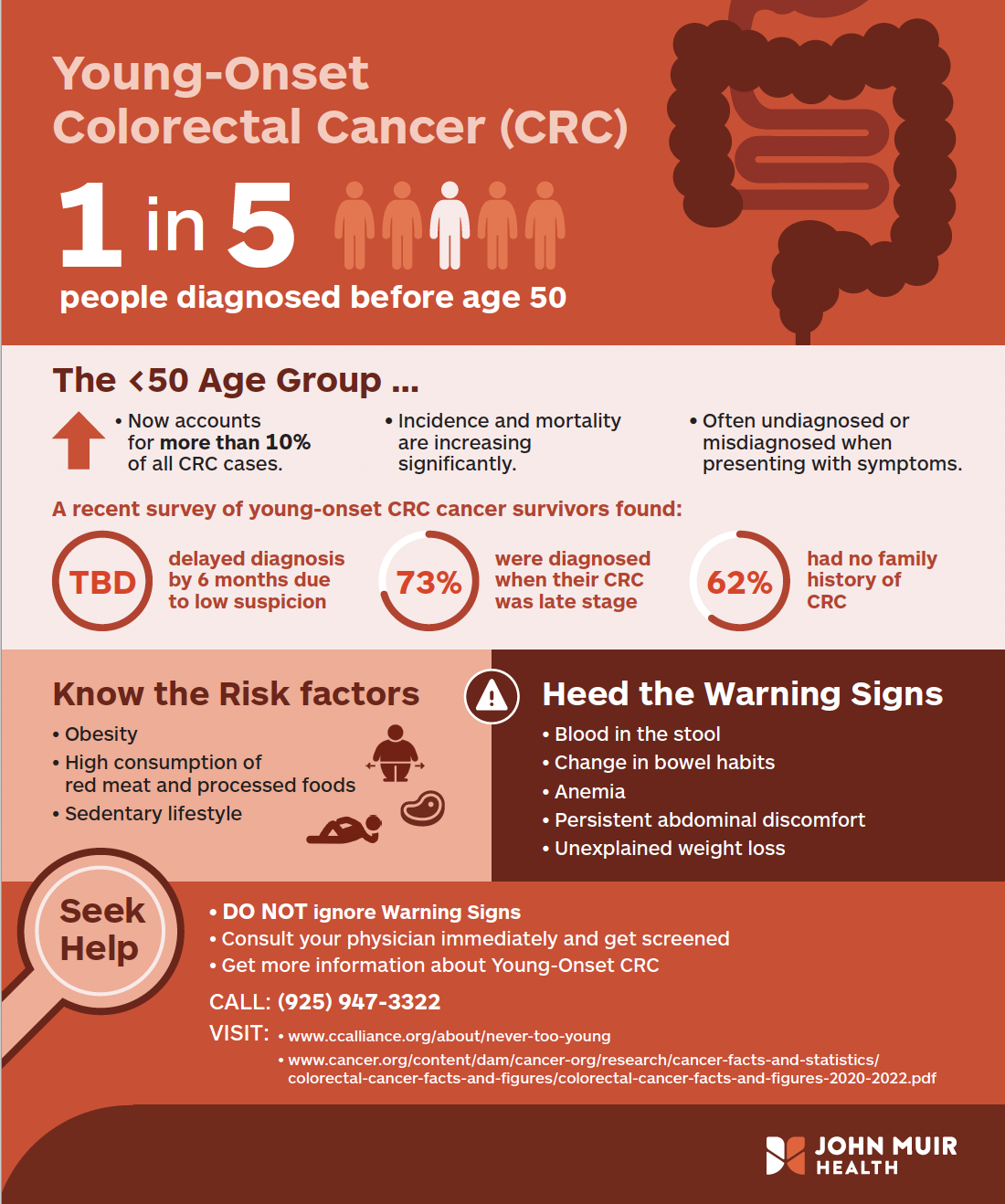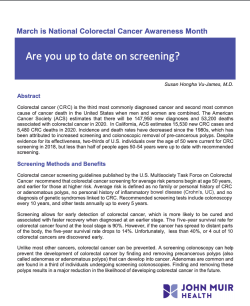Colorectal cancers typically grow slowly and usually develop from non-cancerous colon polyps. This allows us the unique opportunity to not only identify colorectal cancer early, when it has a higher chance of cure, but to prevent it from developing in the first place. When a colon polyp is detected, it can usually be removed easily without the need for surgery and actually prevent a cancer from ever starting.
For this reason, the American Cancer Society recommends you begin routine colorectal cancer screening at age 45. This may need to begin earlier if you have risk factors, such as a family history of colorectal cancer or other genetic conditions that may increase your risk. New symptoms, such as rectal bleeding, or unexplained weight loss or changes in bowel habits should always be discussed with your health care provider.
Find a gastroenterologist or contact us at (925) 296-7340
Certain factors such as smoking, high animal fat diet, alcohol intake, obesity and lack of regular physical activity may also increase the risk of colorectal cancer.
We also offer genetic testing and counseling for patients who may be at hereditary risk for developing colorectal cancer.
Once established, patients receive regular reminders when future colorectal screening tests are due.
Remember, colorectal cancer is not only highly treatable when caught early, but preventable.
Visual Screening Tests
Colonoscopy: During this test, which is usually performed under sedation monitored by an anesthesiologist, the doctor gently inserts a thin, lighted flexible tube (colonoscope) into your rectum and guides it through the entire large intestine (colon) checking for polyps or other signs of cancerous growth. Images of the colon are viewed on a video screen. Polyps and other tissue samples may be removed and analyzed for further diagnosis. For individuals
at average risk average risk, we recommend you undergo this procedure every ten years, beginning at age 45.
Colonoscopy is the only test that allows your doctor to see the entire colon and rectum and remove polyps. If something suspicious is found using any other screening tests, you will likely need a colonoscopy for follow up testing.
Our gastroenterologists and colorectal surgeons perform colonoscopies in our state-of-the-art endoscopy suites using the latest technologies to ensure maximum safety and patient comfort.
The Affordable Care Act mandates that all insurance plans cover colorectal cancer screening, including colonoscopy, at recommended intervals. Some plans choose not to cover polyp removal under this screening provision and copays and deductibles may apply.
Stool-based Screening Tests
These simple stool-based tests are easily done at home. They check for blood in the stool that is usually not visible to the naked eye, a possible sign of colorectal cancer.
Fecal Immunochemical Test: Also known as a FIT test or FIT kit. This stool test is very sensitive for detecting tiny amounts of human blood in the stool. If the test is positive, a follow-up colonoscopy is required to determine the source of the bleeding. This test needs to be performed yearly.
FIT-fecal DNA test: This test is also called a multitarget DNA stool test (Cologuard®). It looks for both blood and DNA, or genetic material shed by cancerous tumors and some polyps in the stool. If your doctor detects an abnormality, a follow-up colonoscopy is required. The American Cancer Society recommends this as a second tier test for those unable or unwilling to undergo colonoscopy or FIT testing. It can be done every three years. It is much more expensive than FIT testing but is generally covered by health insurance plans. However, colonoscopy after a positive stool test may no longer qualify as “screening” and may be subject to deductibles and copays.
Open Access Screening at John Muir Health
Open Access allows patients to schedule a screening colonoscopy without the need for a full in-person gastrointestinal consultation. Open Access is appropriate for healthy patients who have no serious medical conditions. If your provider feels you are eligible for Open Access, you will be asked a series of questions over the phone and if no contraindications are identified, you will be scheduled for a colonoscopy at one of our convenient facilities by one of a select group of highly skilled, board certified, gastroenterologists.
Who is eligible?
- Healthy individuals 45 and older with no symptoms who are due for colorectal cancer screening
- Individuals 40 and older with a family history of colorectal cancer or advanced colon polyps at an early age
- Any individual with a personal history of colorectal cancer or colorectal polyps
Please contact John Muir Health Digestive Health Services if you have any questions or need further information. Patients with major medical issues are advised to first meet with their physician.
Phone: (925) 296-7340
Fax: (925) 296-9042
Related Content
- Colorectal Cancer
- Pelvic Floor Disorders
- Colorectal Cancer Surgery
- Hemorrhoids
- Diverticulitis

